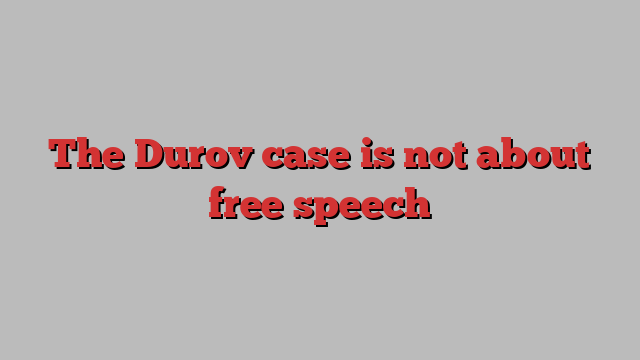
Unlock the Editor’s Digest for free
Roula Khalaf, Editor of the FT, selects her favourite stories in this weekly newsletter.
The hashtag #FreePavel, launched by Elon Musk, spread quickly after Pavel Durov’s recent arrest in Paris. Many of those who reposted it portray the Telegram founder’s detention as an assault on free speech. In any direct sense, it is not. Durov faces preliminary charges in a French probe of Telegram’s alleged failures to address criminality on its platform, including drug peddling and child pornography. A court may ultimately have to decide whether the app broke French law, and whether its Russian-born CEO can be held responsible.
US conservatives and Silicon Valley entrepreneurs have found themselves in strange concert with Russian bloggers in alleging that Durov’s detention shows European tech regulation — certainly more hands-on than the US variety — is on the road to censorship. Senior Russian officials, among Telegram’s most avid users, claim Paris is trying to force Durov to hand over the app’s encryption keys. Top marks to Moscow for gall: Durov has said he fled Russia in 2014 and sold his VKontakte network to Kremlin-friendly buyers after refusing demands to share Ukrainian user data. Russia tried to ban Telegram in 2018.
The app’s distinctive ethos and structure reflect Durov’s Russian experiences, and explain the scrutiny it is now under. It rejects anything it sees as censorship or interference, resulting in much lighter content moderation than most counterparts and a resistance to answering regulators’ or legal agencies’ inquiries — which forms part of the French prosecutors’ complaint. Telegram’s privacy policy says it would disclose user details if a court order confirmed they were a “terrorism suspect”, but adds: “So far, this has never happened.”
These principles have made Telegram an important haven for citizens and beleaguered political opposition groups under authoritarian regimes such as Belarus or Iran. They have also made the platform attractive to extremists and, say monitoring groups, those engaged in criminal activity.
Telegram has called it “absurd to claim that a platform or its owner is responsible for abuse of that platform”. Yet the law and most of society have for decades expected traditional telecoms networks to allow wiretaps under court order for law enforcement bodies pursuing crimes. Online networks should be expected to do the same, in clearly rule-of-law states such as France.
This is complex when data may now be held in servers across multiple jurisdictions. But the nearly 70 countries, including the US, that have ratified the Budapest Convention on cyber crime are already committed to harmonising laws and facilitating co-operation against electronic offences including child pornography — which extends to allowing foreign law agencies to directly query internet service providers. China and Russia are not members.
Given the scope for online platforms to act as hubs for illegal activity or content it is fair, too, to expect them to play their part in curbing such activities. Telegram says it observes EU laws and its moderation is in line with industry standards. Online researchers allege Durov’s platform has become a breeding ground for criminal and extremist groups largely because its restrictions are less tight than US rivals (though they have not entirely solved the problem either).
Free-speech advocates argue that acquiescing to law enforcement requests from democracies would open Telegram up to nefarious requests and threats from autocracies, which often call political opponents terrorists or criminals. But the platform would only enhance its credentials as a haven of free speech if it purged the content that any civilised society abhors. Even the US First Amendment, which gives broad protections to free speech, does not shield content or activities that break the law.